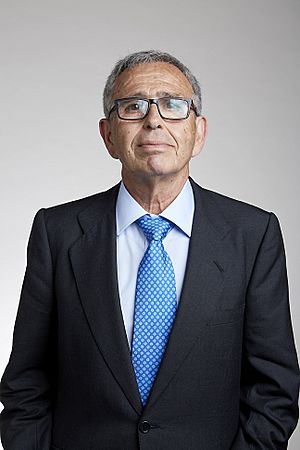Ginés Morata facts for kids
Quick facts for kids
Ginés Morata
|
|
|---|---|

Morata in 2017
|
|
| Born |
Ginés Morata Pérez
1945 (age 80–81) |
| Alma mater | Complutense University of Madrid (PhD) |
| Awards | Prince of Asturias Prize |
| Scientific career | |
| Institutions | Autonomous University of Madrid University of Cambridge |
| Thesis | Herencia celular de la determinación en Drosophila (1973) |
| Doctoral advisor | Antonio Garcia-Bellido |
Ginés Morata Pérez is a famous Spanish scientist. He is a research professor at the Autonomous University of Madrid in Spain. For more than 40 years, he has been an expert in how living things grow and develop. He especially studies tiny insects called fruit flies.
His Early Studies
Ginés Morata went to school at the Universidad Laboral de Sevilla. He also studied at the Complutense University of Madrid. In 1973, he earned his PhD degree. His special research was about how traits are passed down from parents to offspring in fruit flies. His teacher, Antonio Garcia-Bellido, helped him with this important work.
Discoveries in Biology
As of 2017, Ginés Morata's research focused on how cells compete with each other. This is important for understanding how cells die in a controlled way (called apoptosis) and how cancer starts (called carcinogenesis). His lab also studied how parts of the fruit fly, like their developing wings, can grow back or repair themselves.
Morata has been part of many big discoveries. For example, he helped find out about "developmental compartments." These are like special areas in a growing animal where cells are kept separate. He also discovered how cells compete and how genes are linked to these compartments. He helped figure out the structure of special genes called Hox genes, which control how body parts form. He also found out that dying cells can send signals that help other cells grow.
He worked for several years in the United Kingdom. He did advanced research at the Laboratory of Molecular Biology at the University of Cambridge. There, he worked with another famous scientist, Peter Anthony Lawrence.
Awards and Recognition
Ginés Morata has received many special awards and honorary degrees. These include the Spanish National Prize for Research in Biology in 2002. He also won the Mexico Prize for Science and Technology in 2004. In 2007, he received the Prince of Asturias Prize for Science and Technology, which is a very important award in Spain.
In 2017, he was chosen as a Foreign Member of the Royal Society. This is a very old and respected scientific group in the United Kingdom. In 2018, he was also elected as a foreign associate of the U.S. National Academy of Sciences.
See also
 In Spanish: Ginés Morata para niños
In Spanish: Ginés Morata para niños

